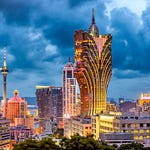Welcome to East West Hurricane! 🌪
We update you on the most essential news from Asia in tech, media, and business—the things you need to know that you probably haven’t heard in Western media.
Follow us on Twitter and Instagram! ⚡️
The Big Moment for Indian Tech 📱
India’s expulsion of 59 Chinese apps earlier this week is a watershed moment in Indian tech, depending on how long the ban lasts and what happens next. This op-ed by Vivek Wadhwa in the Hindustan Times describes some of the potential tech opportunities this gives to India, framing this positively. At the same time, other opinion pieces like this one from Apar Gupta in The Hindu criticise the ban. The closest thing to this ban is how China banned Western tech companies like Facebook and Instagram. You could argue that China’s own consumer tech companies (WeChat, Weibo, QQ, etc.) were able to thrive because they didn’t have as much competition from Western tech alternatives. Could India now execute on a similar strategy, creating natively Indian versions of these banned Chinese mobile apps?
Another angle to this is looking at what else is currently affecting India’s labour market—US Visas. Donald Trump recently announced that several US work visas will have their approval processes suspended until the end of the year, including the H-1B visas most commonly used by the US tech industry. Putting aside the cultural, social, and psychological consequences of this decision on the US’s ability to attract foreign talent, it has a significant impact on India specifically. India accounts for 70% of the 85,000 total H-1B visas issued annually, so thousands of Indian employees and American tech companies have had their 2020 plans disrupted.

Now suddenly India’s tech landscape has less competition, because of banned Chinese apps. At the same time, India’s highly skilled tech workers who would have moved to the US for job opportunities suddenly cannot, because of restrictions in US work visa policy. What could this mean for India?
AngelList launches EquityList for India 💸
AngelList is one of Silicon Valley’s best known companies, a marketplace/job listings site that connects startup founders with angel investors. They have just announced the launch of a new product specifically for the Indian market called EquityList. EquityList is a tool that allows founders to manage their equity stakes, issue equity to employees, and perform a host of other equity-related functions. This takes out many of the operational and fiscal burdens that comes with distribution and tracking of equity in a startup.

This is just the latest in a series of new investments made by AngelList specifically targeting India. They also launched an Indian micro-VC fund called iSeed in May. AngelList India itself was launched in 2018. Things are heating up in the Indian tech market—there are surely many more announcements to come.
This week, the Korean Academic Society for Public Relations hosted an event in Seoul discussing how to promote Korean Culture in a post-Covid world. The event was sponsored by the Korean Culture and Information Service, and supported by several government officials. The attendees discussed how to frame the positive messaging of Korea given the country’s relative success in stopping Covid and how to choose the right medium to deliver these messages.

Promoting your country’s ‘brand’ has always been a thing, whether done by national tourism boards or other government agencies. Putting aside Covid, Korea’s ‘brand’ has been rising rapidly over the last five years and seeing these types of events makes me realise that the Korean government takes this seriously. I’m currently in New Zealand, and there have been similar discussions raised by certain government officials on how to capitalise on New Zealand’s ‘brand’ in a post-Covid world. Although my opinion is that New Zealand takes this less seriously than Korea, I’m bullish on the commercial and social opportunities afforded to the Asia-Pacific countries who have dealt with Covid effectively.















Share this post